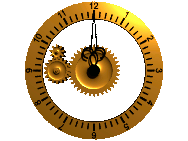




John Mandlbaur is a pseudo-scientist who boldly declared war on the well-established law of conservation of angular momentum, asserting it to be fundamentally flawed. His outlandish defiance culminates in a ludicrous experiment wherein he spins a yo-yo above his head without the slightest nod to scientific rigor. Disregarding the essentiality of measurements, Mandlbaur brazenly fabricates experimental values to bolster his untenable claims. In a flagrant display of hubris, he dismisses the painstaking work of the scientific community that was done over the past 340 years.
Not only is he insulting the work of Newton from which the law of conservation of angular momentum is a direct consequence, but he is also insulting the great scientists who implicitly acknowledged it, such as Einstein, Schrödinger, Dirac, Planck, Heisenberg, Fermi, Bohr, De Broglie, Feynman, Lorentz, Noether, Curie, and many others.
It has to be mentioned that, for reasons that nobody can understand, he proudly reveals that none of his papers has ever been considered for peer review by the hundreds of editors to whom he submitted them (no wonder why, as we shall see). He also proudly tells that he made his “discovery” 10 years ago and that he has been fighting since then for the scientific community to recognize it. In other words, he's telling us that after 10 years of receiving daily explanations from thousands of real scientists about why he is wrong, he is still incapable of understanding something as simple as angular momentum conservation, while it usually only takes a few hours for freshmen to master the subject.
In addition to being arrogant, the character is a blatant liar and a coward who flees every single time we make him face his lies and mistakes. When fleeing from a proof that he lied or that he is wrong, his favorite replies are:
Also, when he loses an argument, he likes to reply with an unrelated wrong statement that he finishes with a question tag, probably with the hope that his interlocutor will focus on denying that new wrong statement and will forget to claim victory over the entire argument.
Below is the most intelligent picture ever taken (top) and one of John Mandlbaur's claims (bottom).
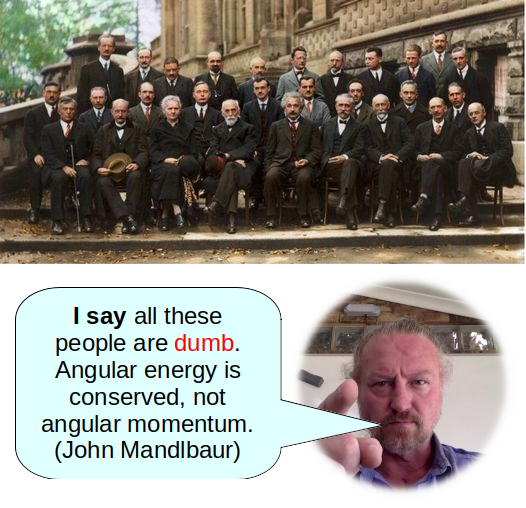
John Mandlbaur has reinvented physics (and some math) starting back from Aristotle's time. Here is a non-exhaustive list of his ridiculous claims:
Before looking at his “proof”, it is instructive to look at John's Twitter profile. Below is a screenshot of it:

There, we can find his rag, which he qualifies as the “perfectly well written and undefeated proof of his historical discovery”. Let us take a look at the first page:
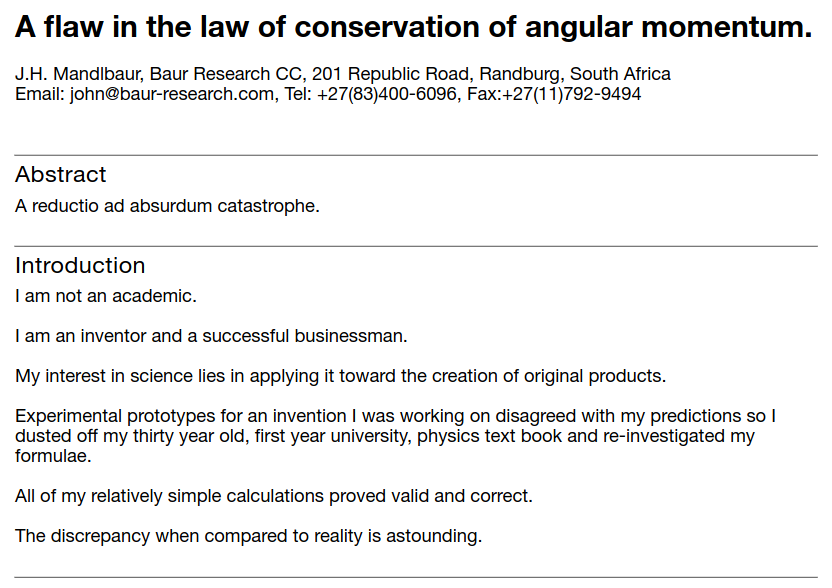
In his hilarious and arrogant introduction, we can discover that he thinks that he is an inventor and successful businessman. This is a lie that is easy to debunk. If we go to his website, www.baur-research.com, the first thing we can see is that it shows only one device, the “eClock”. Then we can quickly realize that there is nothing professional about the device and, above everything, he is incapable of explaining clearly what the device is supposed to do. Also, as we will discover more details about the character in what follows, it will be obvious that he didn't design this device. Either someone else did, or he found some schematics on the Internet that he simply used “as is”, without understanding anything on how the device works. Indeed, although the object involves relatively simple analog and digital electronics, performing the necessary calculations to understand how it works is way above his capabilities. This became obvious when, in order to test him, I asked him a very simple question about charging a capacitor through a resistor that he was unable to answer. Seriously, what kind of inventor could design an analog circuit without having any clue about RC circuits?
It is very likely that he never sold any of his eClocks, although he is showing some reviews from people who supposedly bought the device. Here is a screenshot that I took, in case he changes his website:

It was easy to prove that these reviews are just made up. In order to do this, I asked him on Twitter to explain the following:
Let us look now at the second page of his rag:
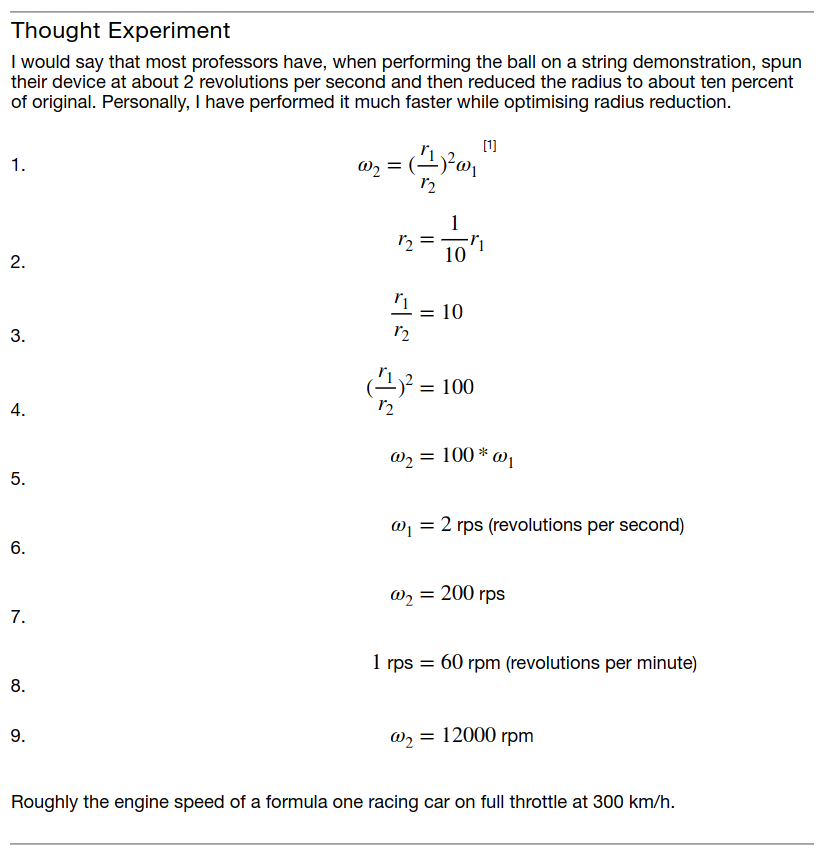
Remember that he called his rag the “perfectly well written and undefeated proof of my historical discovery”. It doesn't take more than five seconds to realize that the writting is terrible, ressembling to that of an eight-years old. He mentions the experiment of “a ball on a string”, without explaining what it is and writes equations without explaining what he is doing. However, after looking at the equations, we can easily conclude that he is considering an experiment in which a ball is attached to a string and spun above his head at an initial angular velocity of 2 rounds per second. Then by pulling the string, the radius of the circular trajectory is reduced to one tenth of the initial radius, and a final angular velocity is observed. Surprisingly, he was able to perform the calculation correctly and concluded that conservation of angular momentum predicts a final angular velocity of 200 rounds per second, or 12000 rpm. This value of 12000 rpm seems to be what triggered his mental break down. If you try to talk to him about angular momentum, you will realize how obsessed he is with these 12000 rpm.
So far, there is nothing wrong with these 12000 rpm, but then comes the third page which he entitled the “proof”:

I won't comment more than necessary about the fact that he ignores that assigning numerical values without units to physical quantities is meaningless, such as what he does in equations 11, 12, 13, 16, 17, and 18.
The point is that he doesn't like these 12000 rpm, and absolutely wants to prove the prediction wrong by considering kinetic energies. Although he is not fooling any real scientist, he tries to fool non-scientists by using two decoys. The first one is that he is making a comparison of the energy for a case where the radius is reduced to one hundredth of its original length, thus without any connection with the system that led to his obsessional 12000 rpm. So, he finds an increase of energy of 1 million percents for that new system, while the increase of energy associated to the original system is actually only 10000 percents. The second decoy is that he uses percentages for comparing the energies, while he used ratios for the radii and angular momentum. In other words, the 10000% increase in the kinetic energy when reducing the radius down to one tenth of the original value only means that the energy has been multiplied by 100, which no longer looks so incredible. In all cases, the point is that he never proves anywhere that the 12000 rpm are wrong, he simply uses his argument of authority (authority which he doesn't have at all, by the way) as “the proof” that 12000 rpm is impossible.
Also, he is purposely ignoring what the existing theory really says, although thousands of people have already explained it to him: The theory never said that angular momentum is conserved in all cases. What the theory says is that the rate of change of angular momentum is equal to the external torque applied to the system. It is only when the external torque is zero that angular momentum is conserved. But when we mention this to him, his answer is “bullshit”.
Thus, so far and as opposed to what he says, he hasn't proved that 12000 rpm is wrong. But he claims that his math proves it wrong. As an alternative theory, he proposes that it is angular energy (understand rotational kinetic energy) that is conserved, so that his prediction for the final angular velocity is only 1200 rpm. Then comes his “experimental proof” which is just ridiculous:
In order to prove him wrong, I made two real experiments and one thought experiment:
Nevertheless, in order to give him an ultimate proof that his theory of angular energy conservation cannot be correct, I asked him where the energy that he puts into the system goes when he pulls the string in order to reduce the radius. He first replied that it goes into “fighting the centrifugal force”. I explained to him that (i) the centrifugal force is a fictitious force, it does not exist, and it was invented for the purpose of being able to apply Newton's 2nd law in non-inertial frames, and (ii) the centrifugal force is not involved at all when we consider the system from the inertial lab frame. Then, I asked him again where the energy goes. He replied that energy was irrelevant. I made him notice that energy should be the most important quantity to consider for this theory, since his claim is that angular energy is conserved. He fled again. Clearly he doesn't know where the energy goes, and thinks that it magically disappears. Conversely, when the string is released, resulting in an increasing radius, it is the system that does some work on the hand holding the string and, according to his theory, this work is done for free. In other words, his ball on a string is a free energy generator! In order to prove him wrong (once again), I calculated explicitly the work done by pulling the string, and showed that it is exactly equal to the change in angular energy predicted by conservation of angular momentum. With no surprise, he fled again. My calculation is explained here:
At some point, I told John Mandlbaur that it was easy to derive the law of conservation of angular momentum from Newton's 2nd law. In order to move away from this fact that proves (once again) his theory wrong, he was forced to conclude that Newton's 2nd law is wrong. But he went further and claimed that "Newton's laws are wrong", which implicitly means the three laws are wrong. As a proof of his claim, here is a screenshot of a message he sent me:
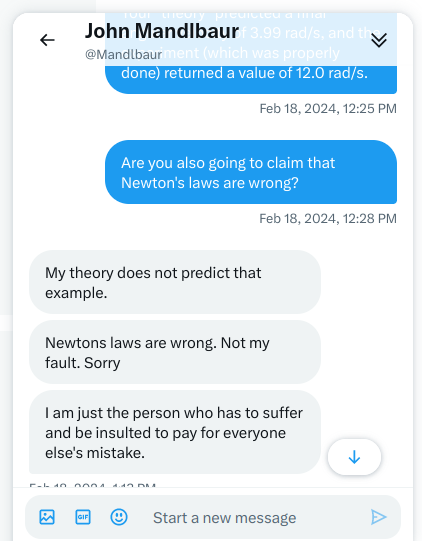
It is important here to remind that there is no theoretical nor experimental reason to doubt that the 1st law is true. Whereas the concept of force loses its meaning in the framework of quantum mechanics, the 2nd law in the form originally proposed by Newton (F=dP/dt) remains true even in the framework of the theory of Relativity. Finally, it is well-known that the 3rd law is said to break down when involving action at a distance with objects moving at relativistic speeds, but this is totally irrelevant since we are doing pure classical mechanics here (and, anyway, the character thinks that both quantum mechanics and relativity are wrong).
Although testing Newton's laws is routinely performed by students in their first year of physics classes, I found it fun to redo these experiments, just for the pleasure of proving John Mandlbaur wrong again. In the video below, I am testing Newton's 1st law by using a cart rolling a level track with low friction, and a motion detector to record the speed. With no surprise, the law successfully passes the test:
In order to test the 2nd law, I added a fan to the cart that produces a constant force, and I recorded the acceleration for different masses added to the cart. According to the law, the acceleration should be constant for any given mass, and it should be inversely proportional to the mass. The following experiment shows a very good agreement with the law:
In order to test the 3rd law, I used two force sensors attached to one another, and checked that whenever I use one of the sensors to apply a force on the other one, they both record exactly the same magnitude for the force:
Ok, this one is hilarious! Take a look at his one-page rag:
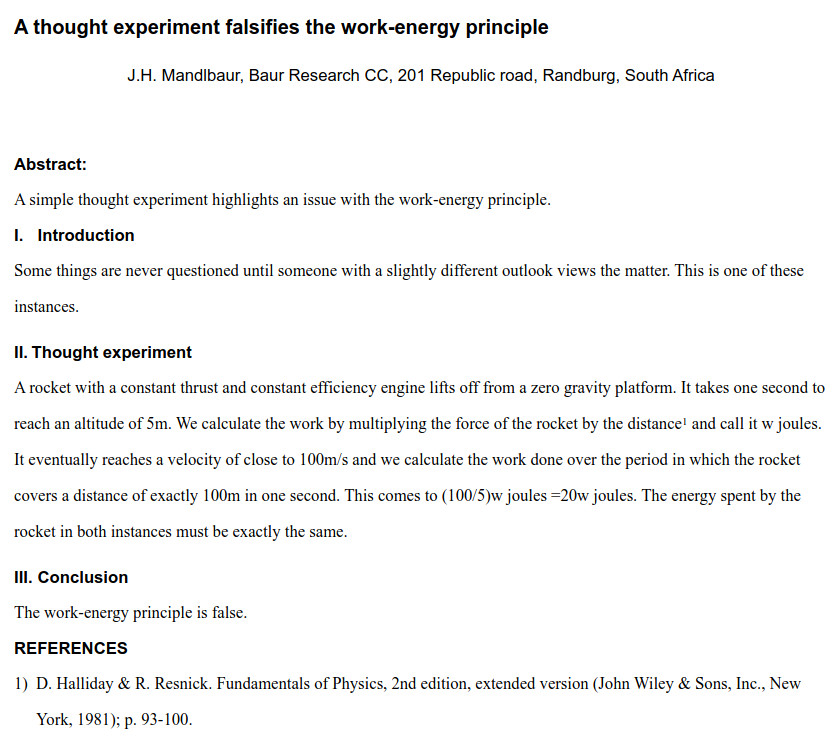
Seriously, how can he think for a single fraction of a second that it could ever be published? This is a high concentration of pure ignorance and misconception. There are some obvious mistakes:
In the video below, I explain all this in details, and I perform an experiment that successfully supports the work-energy principle. I also derive the correct equations that describe the motion of a rocket, and give a generalized version of the work-energy theorem that can be applied to it.
Apparently, he hasn't written a rag yet about this, but he made his claim clear when someone asked on Quora for evidences that support the validity of Quantum Mechanics (Note that his username on Quora is Anglular Energy, while someone else created the username Angular Bollock to make fun of him):
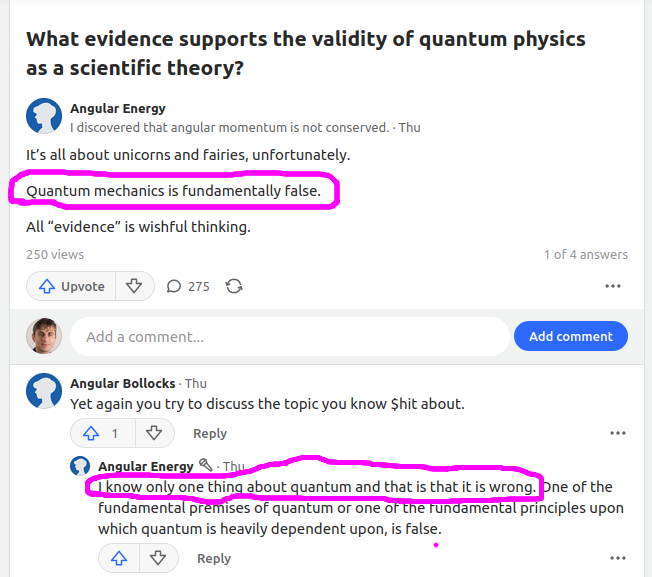
He made his claim clear by answering the question that was asked. Also, when he responded to Angular Bollock's comment, he acknowledged that he has no clue of what Quantum Mechanics is about. By the way, if Quantum Mechanics was wrong, he would have had no computer to write his comments, since these are made of electronic components that are inherently quantum mechanical devices.
 This section is under construction.
This section is under construction.
 This section is under construction.
This section is under construction.
This guy never ceases to amaze me with his ability to expose his stupidity in such a concise manner. You can download his rag here, and below is a screenshot of its single page:
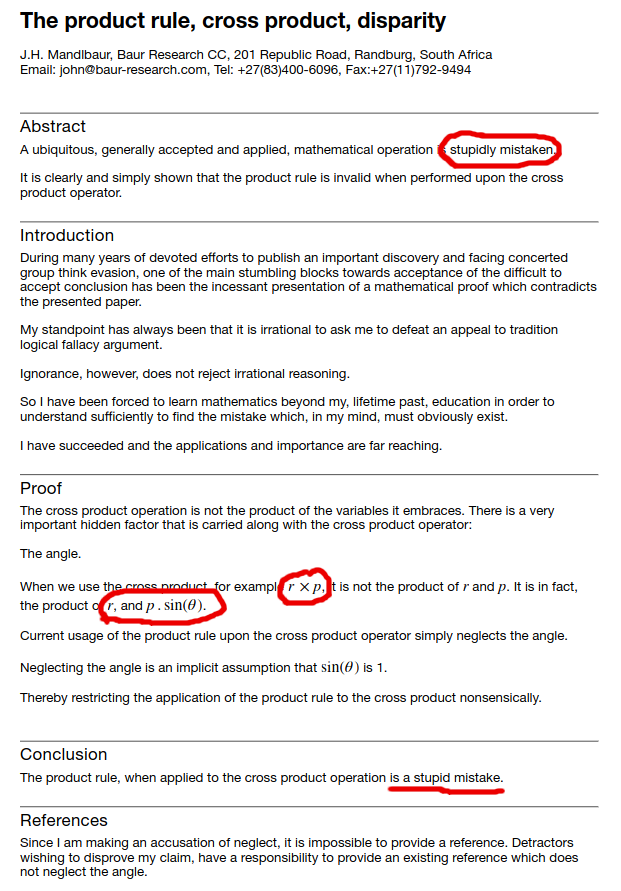
Simply read the introduction if you are in need of a good laugh. For the proof that he is wrong, it suffices to point to the fact that he is trying to equate a cross product (vector) with its magnitude (scalar). Find more details in the video below:
He claims that it is thanks to him that SpaceX is capable of landing their rockets, after he sent an email to Elon Musk telling him that the law of conservation of angular momentum is wrong, and that it is angular energy that is conserved. I know that this sounds like a bad joke, but this is really what he claims. He said that SpaceX kept crashing their boosters until he sent the email about his “discovery”, after what the very next landing was a success. No need to comment any further about this, simply take a look at this Twitter conversation I had with him:

Not sure you want to subscribe? Take a peek at the description of the Blue Moonshine channel to get an idea of its contents.